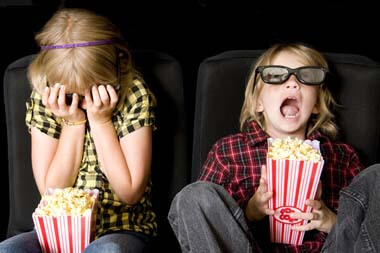Horror Movies and Their Impact on Children
By Michael Hart, M.A, C.C.C.
 The fact that scary movies such as, “The Exorcist,” “What Lies Beneath, “ and “The Sixth Sense” have done so well at the box office, shows there is a big demand for scary movies and that many people see these films as just another form of entertainment. However, a study conducted by researcher Kristen Harrison of University of Michigan, and Joanne Cantor of the University of Wisconsin shows that children who watch scary movies suffer a number of negative effects that, in some cases, continue well into adult life.
The fact that scary movies such as, “The Exorcist,” “What Lies Beneath, “ and “The Sixth Sense” have done so well at the box office, shows there is a big demand for scary movies and that many people see these films as just another form of entertainment. However, a study conducted by researcher Kristen Harrison of University of Michigan, and Joanne Cantor of the University of Wisconsin shows that children who watch scary movies suffer a number of negative effects that, in some cases, continue well into adult life.
Of the 150 university students that were studied, it was discovered that 52 percent experienced negative effects such as sleep disturbance, affected appetite, or fear of a situation depicted in the movie. When it comes to the effect of movies on thought patterns, the researchers found about 25 percent of the students reported
being unable to stop thinking about frightening scenes. Other studies have mentioned similar negative effects on children: nyctophobia (fear of the dark), feeling of being watched, and nightmares, to name a few.
The research also found that these negative effects were not transient but lasted for more than a year for 36 percent of the subjects and that 25 percent were still exhibiting negative reactions to what they had seen years ago.
Harrison, in reflecting on the study, said that the negative emotional reactions to scary movies are similar to those typically found in people who see a traumatic or frightening situation in real life. It seems from what Harrison is saying that our brain does not differentiate between a scene that is real and a scene that is produced.
Although the research identified five common categories of fear producing stimulus, the most common involved blood and injury. The majority of participant, 65 percent, reporting this category was most disturbing. According to Harrison, “the ubiquity of blood and gore in the U.S. media should be cause for concern regarding its potential for causing enduring fright reactions in children.”
The research also dismissed the popular notion that children who like scary movies are less affected than those who don’t. The study found that one key determinant factor on effect is the age of the child. The younger the child at the time of viewing the longer was the negative effect.
This research serves as a warning to parents, grandparents, and others who supervise children, to play an active role in protecting our kids minds and emotions by monitoring what they are allowed to see not just on television but on-line as well.



















